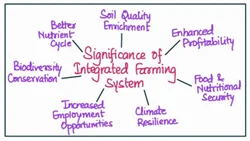Answer:
| Approach:
Introduction
- Define Integrated Farming System (IFS)
Body
- Elaborate on how the Integrated Farming System (IFS) is helpful in sustaining agriculture.
Conclusion
- Conclude stating that Integrated Farming System (IFS) is important for achieving the goal of doubling farmer’s income.
|
Introduction:
Integrated farming system is a type of agriculture that aims to create a balanced and sustainable ecosystem by combining different types of farming practices, such as crop production, animal husbandry, and forestry. The combination is such that the waste of one process becomes the input for other processes.
Body:
The main goal of integrated farming is to optimize the use of resources, reduce the need for external inputs, and increase the overall productivity and profitability of the farm along with year-round employment.

Integrated Farming System ensures sustainable agricultural production through:
- Reduced use of fertilisers: By reducing the use of chemical fertilisers and recycling nutrients, integrated farming helps reduce input cost and also reduces the chemical content in food as well as soil. IFS also helps in pest and weed control.
- Reduced wastage and financial burden: In IFS, by-products of one subsystem works as an input for the other subsystem, making it environmentally sustainable. This reduces wastage and also reduces input cost.
- Reduced environmental damage: IFS promotes the sustainable use of natural resources, reduces the environmental impact of farming practices, and enhances biodiversity.
- Economic activity: Due to multiple activities being performed on the same piece of land, IFS provides employment all through the year and this ensures flow of money round the year amongst the farmers.
- Resource management: IFS promotes efficient management of resources which enhances the productivity of farming. IFS rejuvenates the agricultural systems and helps achieve agroecological equilibrium.
- Financial security: Given the high variability experienced in monsoon, agricultural production is always at risk. IFS reduces this risk by providing alternative sources of income in animal husbandry, horticulture, etc.
- Integration of traditional knowledge: Traditional knowledge in water harvesting, soil management etc. could be efficiently utilised under IFS.
- Nutritional security: Since IFS produces a diverse variety of produce like cereals coupled with poultry, fish, fruits, etc., the malnutrition prevalent due to a single crop diet is corrected. This makes IFS more sustainable.
Conclusion:
The IFS approach can be helpful in sustaining agricultural production by improving resource efficiency, diversification, and livelihoods, while also promoting environmental sustainability. India needs to adopt a well-designed Integrated Farming System (IFS) on a regional basis to realise the vision of doubling farmers’ income by 2022 while ensuring sustainability in agricultural practices.
